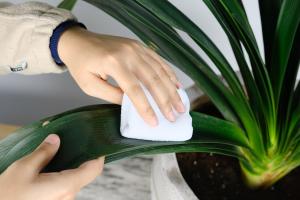How to Stimulate Root Growth in Potted Plants
Potted plants require extra care and attention from their owners as they are unable to grow and access nutrients like plants in outdoor gardens. One critical factor that affects the growth and health of potted plants is their root system. Stimulating root growth is essential to ensure that the plant thrives and produces bountiful fruits or flowers. Here we discuss some proven tips on how to stimulate root growth in potted plants.
1. Choosing The Right Pot and Soil
The first and foremost factor that influences root growth in potted plants is the availability of adequate space and quality soil. Choose a pot that is neither too small nor too large for the plant's size, and make sure it has drainage holes. The pot should be filled with well-draining soil that is rich in organic matter and contains essential nutrients. A high-quality soil mix enables better water retention, providing the roots with the required moisture and oxygen.
2. Proper Watering Techniques
Watering is one of the essential factors that affect the growth and health of plants. To ensure optimal root growth, water your potted plants regularly and adequately, allowing the soil to dry slightly between each watering. Overwatering can lead to root rot and fungal infections, significantly affecting plant growth. It is best to water the plants in the morning to avoid wetting the leaves and foliage during cooler temperatures at night.
3. Fertilizing The Plants
Fertilizing the potted plants with the right nutrients can significantly enhance root growth and development. Use a balanced fertilizer that contains essential nutrients such as nitrogen, phosphorus, and potassium. Applying a slow-release fertilizer once a month is ideal for potted plants, as it releases nutrients gradually, promoting consistent growth and better root development.
4. Adding Beneficial Microorganisms
Potted plants can lack the necessary microorganisms that are beneficial for root growth as they are not present in the soil naturally. Adding beneficial microorganisms such as mycorrhizae and rhizobia to the potting soil can positively impact the plant's root system. These microorganisms form a symbiotic relationship with the plant roots, improving nutrient uptake and enhancing overall plant growth.
5. Providing Adequate Light and Temperature
Appropriate lighting and temperature are essential factors for a potted plant's root growth. Most plants require good lighting to grow, and placing them near a sunny window can help meet their needs. However, excessive heat can also negatively impact root growth, and it is best to keep them away from heaters and direct sunlight during the afternoon. Consistent temperatures between 65-75°F are ideal for most potted plants.
6. Pruning and Repotting
Pruning the plant's roots regularly and repotting them as they grow can also enhance their growth and overall health. Root pruning helps to remove diseased or damaged roots and promotes the growth of new healthy roots. Repotting the plants ensures that they have enough space for the roots to grow and access nutrients better. It is best to repot the plants every 2-3 years, depending on their growth rate.
Conclusion
In conclusion, stimulating root growth is essential to enhance the overall growth and health of potted plants. By following the tips mentioned above, you can ensure that your plants receive the best care possible and thrive in their environment. Always keep an eye on the plants and adjust their care accordingly to promote better root development and happier plants.

 how many times do yo...
how many times do yo... how many planted tre...
how many planted tre... how many pine trees ...
how many pine trees ... how many pecan trees...
how many pecan trees... how many plants comp...
how many plants comp... how many plants can ...
how many plants can ... how many plants and ...
how many plants and ... how many pepper plan...
how many pepper plan...































